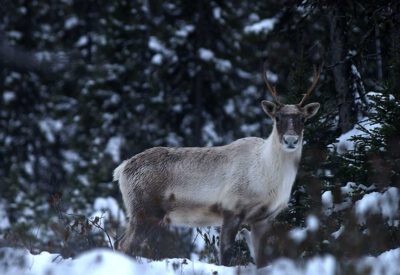
OTTAWA/TRADITIONAL, UNCEDED TERRITORY OF THE ALGONQUIN ANISHNAABEG PEOPLE — A new draft conservation agreement for threatened boreal caribou in Ontario is the weakest ever proposed in Canada and falls alarmingly short of meeting legal standards for habitat protection, environmental groups say. Ontario is currently undergoing a public consultation on the draft agreement with the deadline for comments on March 21.
Instead of addressing the concerns identified in the latest Auditor General of Ontario report, the agreement rubber stamps Ontario’s broken policy framework governing threatened wildlife. The draft agreement contains no commitment or targets for the protection or restoration of critical caribou habitat. Instead, it perpetuates approaches like logging and road building that have stymied the recovery of caribou, the groups say.
The agreement would formally enshrine the province’s controversial forestry policies that continue to damage and destroy more critical caribou habitat, while providing Ontario with millions that would only fund more process and delays.
Ecojustice, on behalf of Wildlands League, Ontario Nature and David Suzuki Foundation, recently warned the federal Minister of Environment and Climate Change Steven Guilbeault in a legal letter that if the draft conservation agreement is signed unchanged, the groups may launch legal action to bring the government into compliance with its statutory duties under the federal Species at Risk Act (SARA).
To date, more than 16,000 letters and messages have been sent to Minister Guibeault calling on him to stand up for Canada’s vulnerable wildlife when provinces like Ontario turn their backs on them. Under SARA, the federal government can invoke a “safety net” to protect habitat when provinces fail to effectively protect critical habitat. A safety net order allows Cabinet to extend SARA protection to species on provincial and territorial lands.
Conservation agreements with a province or territory are another tool the federal government can use to benefit a species at risk or enhance its survival in the wild. The proposed bilateral conservation agreement between Ontario and Canada was first introduced in 2019 under Section 11 of the federal Species at Risk Act (SARA). The most recent version up for consultation fails to meet critical habitat thresholds required under SARA. This failure will push caribou closer to extinction in seven out of eight ranges that are already declining and that overlap with commercial forestry operations in northern Ontario.
The government’s failure to protect boreal caribou highlights a broader issue with how Canadian governments are failing to protect endangered species and preserve biodiversity. Although the federal SARA lays out critical protection measures, federally listed at-risk species populations declined by 28 per cent between 2002 and 2014. Addressing the issue of protecting boreal caribou is as much about protecting an individual species as it is about ensuring our legal frameworks can promote biodiversity and species-thriving on the whole.









